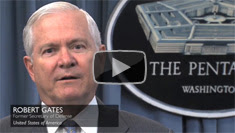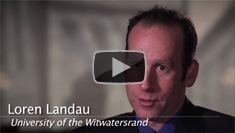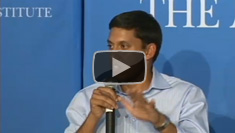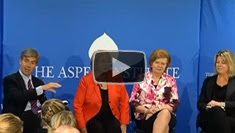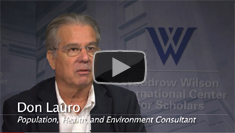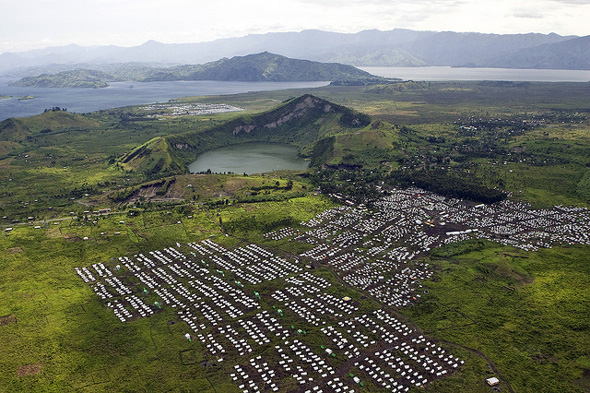Showing posts from category video.
-
Remembrance: Wangari Maathai, Nobel Peace Prize Winner, Linked Environment and Conflict
›September 26, 2011 // By Schuyler NullSad news today as Wangari Maathai, the first African woman and the first environmentalist to win the Nobel Peace Prize, has passed away in Nairobi. The Green Belt Movement, which Maathai founded in 1977, has planted over 30 million trees and advocates for what Maathai called the three essential components of a stable society: sustainable environmental management, democratic governance, and a culture of peace. [Video Below]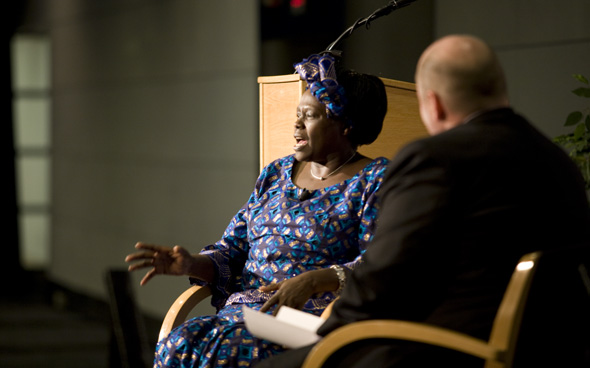
“Almost every conflict in Africa you can point at has something to do with competition over resources in an environment,” said Maathai during her visit to the Wilson Center in 2009:Unless you deal with the cause, you are wasting your time. You can use all the money you want for all the years you want; you will not solve the problem, because you are dealing with a symptom. So we need to go outside that box and deal with development in a holistic way.
Maathai’s message was molded from her experiences in Kenya and across sub-Saharan Africa in general. She was not shy about condemning African leaders and advocating for women in the political space. In ECSP Report 12, she wrote, “I come from a continent that has known many conflicts for a long time. Many of them are glaringly due to bad governance, unwillingness to share resources more equitably, selfishness, and a failure to promote cultures of peace.”
Importantly, though, Maathai advocated for addressing these issues in concert, not separately. She said at the Wilson Center:I can’t say, ‘Let us deal with governance this time, and don’t worry about the resources.’ Or, ‘Don’t worry about peace today, or conflicts that are going on; let us worry about management of resources.’ I saw that it was very, very important to use the tree-planting as an entry point.
A Message to the World
Some raised questions when Maathai won the Nobel Peace Prize in 2004 – the first awarded to someone from the environmental field – but the recognition was more than deserved, wrote Environmental Change and Security Program (ECSP) Director Geoff Dabelko on Grist:Maathai is on the front lines of the struggle over natural resources that fuels conflicts across the world. While there is no dramatic footage of tanks rumbling across borders or airplanes flying into buildings, the everyday fight for survival of those who depend directly on natural resources – forests, water, minerals – for their livelihoods is at the heart of the battle for peace and human security.
Maathai explained in Report 12 that she thought her winning of the prize was intended as a message to the world to “rethink peace and security.”
…
Elevating such a strong Southern voice – and one whose elephant’s skin bears the scars of the fight for peace – is a noble choice.
The Nobel Committee “wanted to challenge the world to discover the close linkage between good governance, sustainable management of resources, and peace,” she wrote. “In managing our resources, we need to realize that they are limited and need to be managed more sustainably, responsibly, and accountably.”
Sources: Grist, The New York Times.
Photo Credit: David Hawxhurst/Wilson Center. -
Gates and Winnefeld: Development a Fundamental Part of National Security
› “As we’ve learned in Iraq and Afghanistan, reconstruction, development, and governance are crucial to any long-term success – it is a lesson we forget at our peril,” said Former Secretary of Defense Robert Gates in a video address commemorating the U.S. Agency for International Development’s 50th anniversary this fall. Gates was joined by Admiral James Winnefeld, Jr., the vice chairman of the Joint Chiefs of Staff, in a post on USAID’s Impact blog to reinforce the importance of development and USAID in particular to U.S. national security.
“As we’ve learned in Iraq and Afghanistan, reconstruction, development, and governance are crucial to any long-term success – it is a lesson we forget at our peril,” said Former Secretary of Defense Robert Gates in a video address commemorating the U.S. Agency for International Development’s 50th anniversary this fall. Gates was joined by Admiral James Winnefeld, Jr., the vice chairman of the Joint Chiefs of Staff, in a post on USAID’s Impact blog to reinforce the importance of development and USAID in particular to U.S. national security.
USAID was created on November 3, 1961 as part of a total overhaul of U.S. foreign assistance by President Kennedy. From the start, President Kennedy understood that the agency would play a role not just in development abroad but in improving U.S. security as well.
The agency is marking its 50th anniversary in an environment where development and security are seen as perhaps more linked than ever.
Winnefeld described the work that USAID and the military do as going hand-in-hand, saying that “together, we play a critical role in America’s effort to stabilize countries and build responsive local governance.”
In country after country, Winnefeld said, “USAID’s development efforts are critical to our objective of creating peace and security around the world.” He added that “instability in any corner of today’s highly interconnected world can impact everyone. Development efforts prevent conflicts from occurring by helping countries become more stable and less prone to extremism.”
“For 50 years,” Gates said, “USAID has embodied our nation’s compassion, generosity, and commitment to advance our ideals and interests around the globe. It’s a commitment demonstrated every time this agency works hand-in-hand with communities worldwide to cure a child, build a road, or train a judge.”
“By improving global stability,” Winnefeld concluded, “USAID helps keep America safe.”
Sources: USAID.
Video Credit: USaidVideo. -
Loren Landau: We Need to Move Beyond Traditional Views of Migration
› Addressing the role of subnational actors, from local governments to mining companies, is increasingly critical to understanding migration, said Loren Landau, director of the African Center for Migration and Society at the University of the Witwatersrand, in an interview with ECSP. These actors frequently exert more influence than national governments over human resources because they control the “space in which people live, the space in which they produce,” Landau said.
Addressing the role of subnational actors, from local governments to mining companies, is increasingly critical to understanding migration, said Loren Landau, director of the African Center for Migration and Society at the University of the Witwatersrand, in an interview with ECSP. These actors frequently exert more influence than national governments over human resources because they control the “space in which people live, the space in which they produce,” Landau said.
Migration is most frequently seen as an aberration or a temporary coping mechanism, but this conception is outdated. According to Landau, “especially as rural livelihoods become less viable, movement will be the norm.”
Local and global actors must recognize that “people are moving, and they are moving to a whole range of new places,” he said. These new places will need attention and resources, but we will need to move beyond traditional views of migration in order to respond to the challenge. -
Development or Security: Which Comes First?
› “Let’s take an area of conflict of great concern to us: Afghanistan. One of the very concrete questions is, do you invest your development efforts predominantly in the relatively secure parts of Afghanistan, which gives you more security gains in terms of holding them, or in the relatively insecure parts, where you’re most concerned with winning against the Taliban and the battle seems most in the balance?” With that question, Richard Danzig, the chairman of the board for the Center for a New American Security (CNAS), got to the heart of the issues being debated at a recent panel on development assistance and national security.
“Let’s take an area of conflict of great concern to us: Afghanistan. One of the very concrete questions is, do you invest your development efforts predominantly in the relatively secure parts of Afghanistan, which gives you more security gains in terms of holding them, or in the relatively insecure parts, where you’re most concerned with winning against the Taliban and the battle seems most in the balance?” With that question, Richard Danzig, the chairman of the board for the Center for a New American Security (CNAS), got to the heart of the issues being debated at a recent panel on development assistance and national security.
The discussion, hosted on September 5 by the Aspen Institute in conjunction with the Brookings Blum Roundtable on Global Poverty, brought together Rajiv Shah, the administrator of the U.S. Agency for International Development; Susan Schwab, professor at the University of Maryland and former U.S. trade representative; Sylvia Mathews Burwell, president of the Bill and Melinda Gates Foundation’s Global Development Program; and CNAS’ Danzig. Most of the hour-long discussion was spent debating whether assistance could be successful in insecure situations (like Afghanistan), or if a place has to have some kind of stability before assistance can really take root and successfully spur development.
Short vs. Long term
Administrator Shah, not surprisingly, made the argument that development assistance is valuable in either instance. That said, he also strongly cautioned against overpromising what aid in a place like Afghanistan can accomplish, saying that “one big mistake we’ve made is to oversell what any civilian agency can do in an environment where there’s an active military campaign.” He pointed out that “it not only raises the cost of doing the work…but it also puts people at real risk.”
Danzig took a more aggressive tone, saying that “in the great majority of cases I think it is misleading and distortive to argue for development on the grounds that it will predominantly enhance security.” He argued that more often than not, security should be a prerequisite for development: “You need to distinguish cart and horse here…in most instances…the security needs to precede the development.”
Shah and Danzig, who dominated the panel, were more in sync about what development assistance can accomplish in longer-term scenarios, when security and stability are assured. Shah in particular spoke forcefully about development assistance over time, stressing that “in the long view, in the medium term, the development priorities are national security priorities.”
Enabling Success
However, Shah did warn that aid could fall short of our goals if it not carried out in a reliable way. “Stability and predictability of finance is the single thing that’s most highly correlated with good outcomes,” he said. When our aid to a country comes and goes unreliably, flowing one year and stopping abruptly the next, it’s much harder to have the kind of positive impact we want it to have, he explained.
“Through the years, where these questions have been debated back and forth, there has been one constant,” said moderator Jessica Tuchman Mathews, president of the Carnegie Endowment for International Peace. “We have always multiplied the objectives vastly beyond the resources – always.”
Video Credit: Aspen Institute. -
John Donnelly, Global Post
Family Planning and Seven Billion at the Aspen Institute
›September 9, 2011 // By Wilson Center Staff
The original version of this article, by John Donnelly, appeared on Global Post.
Sometime this fall, the world’s population will reach 7 billion people. Experts now forecast that by 2050, the population could be 10 billion.
Those numbers, said the former presidents of Chile and Latvia at an event in Washington D.C., Wednesday night, should force policy makers to focus more intently on making family planning much more widely available in the developing world.
“When we are 9, 10 billion people, what are we going to do? Go to Mars? Go to the moon?” said Michelle Bachelet, the former president of Chile and now the Under Secretary-General and Executive Director of UN Women, the latest agency created by the United Nations. “We are really going to have huge problems. Family planning is a huge issue.”
Her comments came during a series of discussions organized by Aspen Global Health and Development called “7 Billion: Conversations that Matter.” The talks, funded in part by the U.S. Agency for International Development, have often centered on global health issues, and Wednesday’s event was no different.
Continue reading on Global Post.
Video Credit: The Aspen Institute. -
Watch: Don Lauro on How Integrated Development Deepens Community Involvement
›September 7, 2011 // By Schuyler Null Population, health, and environment (PHE) projects address an impressive range of issues – natural resource management, family planning, maternal and child health, water, sanitation, nutrition, and strengthening health systems – but perhaps their most important advantage is the level of community involvement elicited, said long-time PHE expert Don Lauro in an interview with ECSP.
Population, health, and environment (PHE) projects address an impressive range of issues – natural resource management, family planning, maternal and child health, water, sanitation, nutrition, and strengthening health systems – but perhaps their most important advantage is the level of community involvement elicited, said long-time PHE expert Don Lauro in an interview with ECSP.
“There’s a depth to these programs,” Lauro said. Tools like rural participatory appraisal allow communities to map out their problems and then come up with solutions on their own. “If you get deep enough, it becomes they who own the project, and I think that that’s your ultimate goal,” he explained. “You have a much greater prospect for sustainability of that effort, no matter what happens to the funding.”
Lauro recently visited the USAID-funded BALANCED Project in Tanzania as part of a wider look at integrated development projects. He emphasized that what exactly this integrated approach is called – be it PHE, HELP, or HELPS – is insignificant; what matters is that these disparate elements are combined. -
‘Dialogue’ TV: Revisiting Mr. Y and “A National Strategic Narrative”
›“We are, what I would call, very non-linear thinkers,” said U.S. Navy Captain Wayne Porter about the white paper he co-authored with U.S. Marine Colonel Mark Mykelby, “A National Security Narrative,” launched by Woodrow Wilson Center President Jane Harman at the Center in April. “We’re almost incapable of restricting ourselves to defense and security in isolation from a much larger perspective,” he told Dialogue TV.
“I think maybe that’s why Admiral Mullen has kept me around – I can offer a perspective that maybe he wouldn’t get from conventional strategists or from conventional planners,” said Porter, who served three out of four tours with the current chairman of the Joint Chiefs of Staff as a special assistant for strategy.
Dialogue host John Milewski sat down with Captain Porter and Robert Litwak, director of International Security Studies and vice president for programs at the Wilson Center, for a discussion about the white paper – published under the pseudonym “Mr. Y” (echoing George Kennan’s seminal “X” article) – and its contention that the United States should move away from an outmoded Cold War-era model of containment, deterrence, and control towards a “strategy of sustainability.”
The narrative has been well received, Porter said: “I think there is an appreciation that it’s a very complex strategic environment that we live in now and that maybe we need to re-look at all of the tools that we could use as a nation to pursue our enduring national interest.”
Inflection Points in History
“The timing of such conversations is cyclical,” said Litwak. “The original ‘X’ article emerged from the end of the Second World War and the advent of the Soviet threat, which required a new conception of international relations that Kennan articulated, as well as the National Security Act of 1947 to line up the U.S. government with this new environment.”
There have also been periods of concern about American decline. “I think what one sees in the current era are both of those trends coming together,” Litwak said:The system is changing – it’s a debatable proposition that the United States is in decline – but we see in the international system rising powers, notably China, as well as transnational trends that are beyond the sovereign control of any single state, which have called into question the nature of the international system…as well as a sense that…there’s something qualitatively different about this recession than the typical economic, cyclical recession and that has to do with the domestic sources of American strength.
These conditions, as well as the source of argument – coming from the military – combined to give particular resonance to the piece, Litwak said.
The Information/Globalization Age
“I think the thing that has changed materially to us is that the information age has brought about an awareness that our environment is completely interconnected,” Porter said. “There’s a complexity to this that can’t be analyzed linearly, that has to have new tools applied.”
“I’d honestly characterize it as significant as the Enlightenment in the 1600s,” he said.
“Certainly we’ve thought in silos and debates have been too often compartmentalized,” Litwak said. “One of the strengths of this piece is that it is truly synthetic – working across the continuum of instruments of power – and talks in a really powerful way about how hard power…has its place, but that the non-military dimensions of American power have been neglected.”
But, Porter said, it’s important to focus on being proactive, rather than reactive:The thing that bothered us most about the strategies that we see every day in our jobs on our side of the river and across the river is that they are almost universally based on anticipating and countering known risk and threat, and our sense is that we have entered an age in which we need to overcome that sense of fear and seize the opportunity to shape the environment of the future as opposed to simply being resilient to it.
As Litwak points out, Secretaries Gates (now former) and Clinton – in the form of the Quadrennial Defense Review, Quadrennial Diplomacy and Development Review, and numerous speaking engagements – have both called for closer integration between State and Defense, more resources for non-military levers of power, and more holistic concepts of security. But unfortunately the greater integration called for in these documents remains unrealized.
Dialogue is an award-winning co-production of the Woodrow Wilson International Center for Scholars and MHz Networks that explores the world of ideas through conversations with renowned public figures, scholars, journalists, and authors. The show is also available throughout the United States on MHz Networks, via broadcast and cable affiliates, as well as via DirecTV and WorldTV (G19) satellite.
Find out where to watch Dialogue where you live via MHz Networks. You can send questions or comments on the program to dialogue@wilsoncenter.org. -
Certification: The Path to Conflict-Free Minerals from Congo
›This summer, the Wilson Center’s Africa Program, in co-sponsorship with the Enough Project, assembled a panel of experts from American, British, and Congolese governments, private industry, and the NGO community to discuss the deplorable situation in the eastern Democratic Republic of the Congo (DRC) involving conflict minerals and certification as a way forward.
After introductory remarks by Wilson Center President Jane Harman, Africa Program Director Steve McDonald introduced John C. Bradshaw, executive director of the Enough Project, who moderated the panel discussion. [Video Below]
Under Secretary of State Robert D. Hormats began by saying the “extremely traumatic” humanitarian situation in the restive areas of the eastern DRC requires “a bold, resolute, and morally inspired response by the United States and other countries.”
Sasha Lezhnev, policy consultant for the Enough Project, explained how the demand for tin, tantalum, tungsten, and gold – for use in batteries, circuit boards, and screens in computers and cellphones – are, in effect, driving the conflict in the DRC.
However, Ambassador to the United States from the DRC Faida Mitifu pointed out that a significant 70 percent of the economy in the eastern regions of the country depends on mining, thus any initiative would have to take into account the livelihoods of the people. In order to assist those communities while a process is formulated, Lezhnev called for targeted development projects in the most affected regions.
The Kimberley Process: A Potential Model?
“If we want to have a lasting impact, we’re going to need a certification process,” Lezhnev said, and we must learn lessons from the Kimberley Process (KP) in order to implement a suitable framework in the DRC.
Clive Wright, who served as the diplomatic negotiator for the KP and head of the foreign policy team for the British High Commission in Ottawa, described the intricacies of the process and its genesis. Under the provisions of the KP, the trade of rough diamonds is permissible, provided that there is a certificate from the country of origin and complementary legislation is in place in the importing country. This agreement was made through consultations and dialogue between the private sector and civil society.
Though successful in certain respects, Wright listed several shortcomings of the KP: it is not legally binding, therefore there are no levers to pull that compel government action; the process is void of an independent monitoring mechanism; and a consensus clause allows one government to block any action which clears the way for the status quo to prevail.
To implement a policy similar to the KP that guarantees legitimate minerals trade in the DRC, Under Secretary Hormats highlighted four key actors that have critical roles independently and collaboratively: 1) regional governments; 2) industry; 3) civil society; and 4) the U.S. government.
Regional Governments
Governments in the region face considerable challenges, said Hormats, as rebel groups trade across borders and evade efforts to rein in the commerce of precious gems, minerals, and arms. The states surrounding the Great Lakes – including Uganda, Rwanda, Burundi, Zambia, Kenya, and the DRC – have coalesced around these issues and developed a plan that will require effective coordination to ensure credibility. Some countries have already established traceability schemes, which are crucial for states that share borders with the DRC, since smuggling is incessant.
With regard to rebel factions, Kinshasa has occasionally participated in joint operations with the governments of Rwanda and Uganda “to stabilize [and] contain the activities of armed groups,” said Ambassador Mitifu. Progress, though slow, has also been made in demilitarizing the mining areas in the Kivu provinces as well as Maniema and in weakening the Congrès National pour la Défense du Peuple’s (CNDP) parallel administration.
The government in Kinshasa has made significant steps toward a certification framework and taken punitive action against military personnel who have engaged in illicit trade, said Ambassador Mitifu. She outlined the efforts the Kabila administration has made to address the issue, including initiatives to put in place a credible certification system so that clean minerals can be exported. In conjunction with MONUSCO – the UN peacekeeping mission in the DRC – the Congolese government has introduced centers where miners can bring their products and feed them into a legitimate supply chain. Finally, Kinshasa is working closely with the private sector, international organizations, and local NGOs to minimize fraud and enhance cooperation. Nevertheless, governance and corruption represent a formidable roadblock in the implementation of any certification process.
Industry Responsibility
Tim Mohin, the director of corporate responsibility for Advanced Micro Devices – one of the largest semiconductor manufacturers in the world – argued that industry can positively influence the supply chain by creating conflict-free smelter programs and a due diligence bulwark where anyone along the supply chain can trace their resources back to a certified smelter.
Customers, Mohin said, are going to have to insist that businesses comply with this tracking system. Under Secretary Hormats agreed with this sentiment, saying that companies that look into the origin of their minerals send a powerful message to the region and the world. He also expressed hope that “companies [would] work to find ways to adhere to legislation [Dodd-Frank] and honor their obligations to their shareholders without shunning the region’s minerals entirely.”
The most difficult stretches along the supply chain are getting buy-in from the miners and the smelters; overcoming the constraints of socio-economic realities on the ground and geo-politics; and the lack of a sustainable tracing system that spans the spectrum of the supply chain. In addition to shored-up U.S. involvement, Mohin called for increased public-private sector partnerships with incentives reminiscent of the Fair Trade system, development aid to assist displaced people, and enhanced security for artisanal miners and their businesses.
Civil Society and Government
Hormats commended the pivotal role civil society has played and must continue to play in highlighting the humanitarian issues at stake, as governments and companies have been only “dimly aware of the link between human rights abuses and the minerals trade.” Furthermore, Wright encouraged civil society’s participation because it serves as a “great policeman” that monitors the bad behavior of governments, especially when the allure of profiteering seeps into deliberations. Moving forward on boosting security for civil society on the ground in the Congo will be essential.
The U.S. government, Hormats asserted, has to do its part to support initiatives on the table to create conflict-free supply chains. If more revenue is invested in legitimizing supply chains, a substantial portion of the problem would be solved. USAID and the State Department are working with civil society to take action against those responsible for illegitimate trade and exacerbating the conflict. Of course there remains work to be done, but as Under Secretary Hormats indicated “this is the most significant moral issue of our time.”
Derek Langford is a program assistant with the Wilson Center’s Africa Program.
Photo Credit: “Aerial View of Camps for People Displaced by Conflict,” courtesy of flickr user United Nations Photo.


